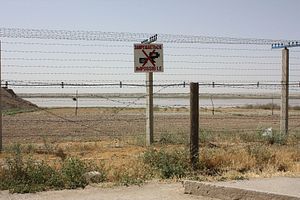Russian Defense Minister Sergei Shoigu is traveling to Kazakhstan and Turkmenistan this week to talk terrorism and regional security.
Shoigu’s first stop, according to Sputnik, was in Astana to meet with Imangali Tasmagambetov, the Kazakh defense minister. On Sunday, an unidentified group of men robbed a pair of gun stores and then stole a commuter bus, which they then rammed into the gates of a National Guard base (after unloading the driver and passengers) in the northwestern city of Aktobe. The latest reports say at least 19 people were killed: 13 attackers, three civilians, and three National Guard servicemen.
Monday, TASS published comments from Kremlin spokesman Dmitry Peskov regarding the incident in Aktobe. “First, the situation is controlled by Kazakhstan’s security forces rather efficiently. And there is hardly a reason for any reinforcement [in Russia close to border with Kazakhstan],” Peskov said (note, the bracketed clarification was included in the TASS quote). He went on to say, “No doubt, this is an absolutely internal affair of Kazakhstan.”
Since the Ukraine crisis erupted, in particular the Russian annexation of Crimea in March 2014, there has been amorphous talk about whether northern Kazakhstan was at risk. Such talk–of Kazakhstan being the “next Ukraine”–may be without concrete substance, but the state’s reaction to it has been firm. For example, in November 2015, a 26-year-old in the eastern Kazakhstan town of Ridder was sentenced to five years in jail. As I wrote at the time: “His crime? Posting a poll on a group (“It Was Heard In Ridder”) on the Russian version of Facebook, VKontakte, that asked whether eastern Kazakhstan should join Russia. He had been found guilty of inciting separatism.”
With this background, Russia’s quick response was not surprising. The Aktobe incidents certainly appear to be a domestic issue–the perpetrators have been identified by local media as locals. The Collective Security Treaty Organization (CSTO), like Russia, responded by saying, through Secretary General Nikolai Bordyuzha, “We are not going to interfere.” While Russia and the CSTO don’t want to get involved in whatever may be brewing in Kazakhstan, Moscow certainly has a vested interest in stability in the Central Asian region.
Much of the same could be said about Shoigu’s next stop: Turkmenistan. Turkmenistan, still avowedly neutral and abstaining from regional security organizations, nonetheless is perhaps the country most likely to need backup in the security realm. With its 744 km border with Afghanistan and lack of experience, the rise in militant activity in northern Afghanistan has given many Central and South Asia regional observers cause to worry about the frontier.
RFE/RL’s Turkmen Service, as detailed by Bruce Pannier, talked to officials in Faryab Province. The officials cited “heavy fighting” in Gormach district, as well as attacks in Qaysar, Dowlatebad, and Khoja Sebiz Posh districts. A spokesman for the Afghan National Army’s 209th Brigade, Colonel Reza Rezai, said “Eighteen villages in Qaysar district are currently under the control of militants, and the Taliban also has an overwhelming presence in the Pashtun Kot district.” These areas are all near the Turkmen border and Afghan local officials say the militants are Central Asians.
According to Sputnik, citing Kommersant, a Russian newspaper, Shoigu will meet with Turkmen Defense Minister Yaylym Berdie to discuss Afghanistan, “as well as struggle against the Daesh militant group.” Note that Afghan officials, speaking to RFE/RL, mentioned the Taliban. And indeed, most reports about ISIS (Daesh) affiliates in Afghanistan mention provinces in the east, not those along the Turkmen border. This may be creative usage of facts on the part of Sputnik as ISIS is a hotter topic than the Taliban. But whatever the affiliation of the militants, the bottom line is that there are militants on the border and Russia –far removed to the north–is nonetheless concerned.
































